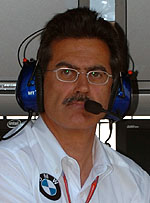


24/10/2006
NEWS STORY
 What is your verdict on the BMW Sauber F1 Team's debut season?
What is your verdict on the BMW Sauber F1 Team's debut season?
BMW Motorsport Director, Mario Theissen: "We've exceeded our expectations with what we've achieved. In our first year we made it onto the podium twice, and that wasn't necessarily to be expected. But far more important was the way we consistently improved our performance throughout the season, and that shows we are on the right track. But we'll only be happy when we close the gap on the top teams."
What were the highlights of the season for you?
MT: "We've made a lot of progress. We already had a car up and running last year for winter testing, we added extra reinforcements on the personnel front and we got the wind tunnel working on a two-shift system. Indeed, we're on course to introduce a third shift by the end of October, which puts us ahead of schedule. A lot of work has gone into turning these plans into reality, but this has all taken place away from the public eye. From an outside perspective, the podium finishes would most probably represent the highlights of the season. What makes me even happier, though, is that the new team has become stronger in relation to the competition over the course of a season, rather than dropping back. And that's the best possible evidence that the measures I've mentioned so far have been taking effect."
And what about the low points?
Theissen: "Those came in the races where we were looking strong going into the GP, but were then taken out of the race by collisions or accidents. That's what happened in Indianapolis, Istanbul und Shanghai, and incidents like these cost us a heap of points. Of course, it isn't great either when you have to retire with technical problems or the car just isn't quick enough on a particular circuit. Those are the sort of setbacks which you can learn from and which give you pointers for the further development of the cars."
What were the team's greatest strengths?
Theissen: "There are many areas I could single out here. Back in 2005 the management needed to put forward an outline plan for the next few years. Then, over the winter we were able to hook up with some strong partners which gave the young team the necessary expertise and budget background. As the season progressed, an extremely promising driver line-up took shape. And ultimately we were able to see the first fruits of the work which had begun a year earlier behind the scenes in terms of results out on the track."
And where do improvements still need to be made?
Theissen: "We are only mid-way through a two-year plan aimed at matching the power of the leading teams. As things stand we are not yet at that level in terms of development. That applies to both our speed of development and the number of projects we have running. With all the necessary people on board and the factory completed, we'll be able to close this gap by the end of 2007."
Did you ever have any doubts about the decision to form this new team?
Theissen: "No."
How is the building work in Hinwil progressing?
Theissen: "At the moment there's a big gap between the existing factory and the wind tunnel. Work on the new building will get underway in the next few weeks and it should be ready to move into by the end of 2007." How many new team members have you recruited – and how many more are you still looking for? Theissen: "So far we've managed to integrate 100 of the 150 new people we had in mind into the team, which means we're on schedule."
When did work begin on the BMW Sauber F1.07?
Theissen: "We came up with the initial ideas for the new car in May 2006, and the aerodynamics department in Hinwil has been concentrating on development work for next year's F1.07 since August. The bulk of the design work began in Hinwil in September."
Looking back, how would you assess the switch to V8 engines?
Theissen: "There was not enough time to prepare for the switchover. All the manufacturers suffered reliability problems in the first half of the season because development work spilled over into the season. The transfer is now complete and, in terms of reliability and specific power output, the V8 engines have reached the level of the V10s."
Are you happy with the engine you have submitted to the FIA for homologation?
Theissen: "Yes, over the second half of the season the engineers in Munich managed to hit on a good combination of power and reliability, which should stand us in good stead for the next few years."
Is BMW reaping greater rewards as a company from the Formula One project by virtue of having its own team?
Theissen: "We have always seen Formula One not only as a marketing platform but also as a technology accelerator within the company – more so than any other team. Up to 2005 we had mainly focused on engine technology and electronics, but in the new team we're also looking at all the other areas, especially aerodynamics. Here as well, there will be a close interaction between the Formula One activities and road car development."